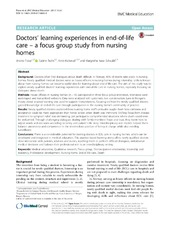| dc.contributor.author | Fosse, Anette | en_US |
| dc.contributor.author | Ruths, Sabine | en_US |
| dc.contributor.author | Malterud, Kirsti | en_US |
| dc.contributor.author | Schaufel, Margrethe Aase | en_US |
| dc.date.accessioned | 2018-07-05T13:39:18Z | |
| dc.date.available | 2018-07-05T13:39:18Z | |
| dc.date.issued | 2017-01-31 | |
| dc.Published | Fosse A, Ruths S, Malterud K, Schaufel MA. Doctors’ learning experiences in end-of-life care – a focus group study from nursing homes. BMC Medical Education. 2017;17(1):1-8 | eng |
| dc.identifier.issn | 1472-6920 | |
| dc.identifier.uri | https://hdl.handle.net/1956/17873 | |
| dc.description.abstract | Background: Doctors often find dialogues about death difficult. In Norway, 45% of deaths take place in nursing homes. Newly qualified medical doctors serve as house officers in nursing homes during internship. Little is known about how nursing homes can become useful sites for learning about end-of-life care. The aim of this study was to explore newly qualified doctors’ learning experiences with end-of-life care in nursing homes, especially focusing on dialogues about death. Methods: House officers in nursing homes (n = 16) participated in three focus group interviews. Interviews were audiotaped and transcribed verbatim. Data were analysed with systematic text condensation. Lave & Wenger’s theory about situated learning was used to support interpretations, focusing on how the newly qualified doctors gained knowledge of end-of-life care through participation in the nursing home’s community of practice. Results: Newly qualified doctors explained how nursing home staff’s attitudes taught them how calmness and acceptance could be more appropriate than heroic action when death was imminent. Shifting focus from disease treatment to symptom relief was demanding, yet participants comprehended situations where death could even be welcomed. Through challenging dialogues dealing with family members’ hope and trust, they learnt how to adjust words and decisions according to family and patient’s life story. Interdisciplinary role models helped them balance uncertainty and competence in the intermediate position of being in charge while also needing surveillance. Conclusions: There is a considerable potential for training doctors in EOL care in nursing homes, which can be developed and integrated in medical education. This practice based learning arena offers newly qualified doctors close interaction with patients, relatives and nurses, teaching them to perform difficult dialogues, individualize medical decisions and balance their professional role in an interdisciplinary setting. | en_US |
| dc.language.iso | eng | eng |
| dc.publisher | BioMed Central | eng |
| dc.relation.ispartof | <a href="http://hdl.handle.net/1956/17874" target="blank"> Livets slutt i sykehjem. Pasientens ønsker og legens rolle</a> | |
| dc.rights | Attribution CC BY | eng |
| dc.rights.uri | http://creativecommons.org/licenses/by/4.0/ | eng |
| dc.subject | Medical education | eng |
| dc.subject | Qualitative research | eng |
| dc.subject | Focus group | eng |
| dc.subject | Doctor-/patient relationship | eng |
| dc.subject | Internship and residency | eng |
| dc.subject | Professional development | eng |
| dc.subject | Nursing home | eng |
| dc.subject | End of life care | eng |
| dc.subject | Death | eng |
| dc.title | Doctors’ learning experiences in end-of-life care – a focus group study from nursing homes | en_US |
| dc.type | Peer reviewed | |
| dc.type | Journal article | |
| dc.date.updated | 2018-07-03T13:00:45Z | |
| dc.description.version | publishedVersion | en_US |
| dc.rights.holder | Copyright the authors 2017 | |
| dc.identifier.doi | https://doi.org/10.1186/s12909-017-0865-8 | |
| dc.identifier.cristin | 1445197 | |
| dc.source.journal | BMC Medical Education | |

